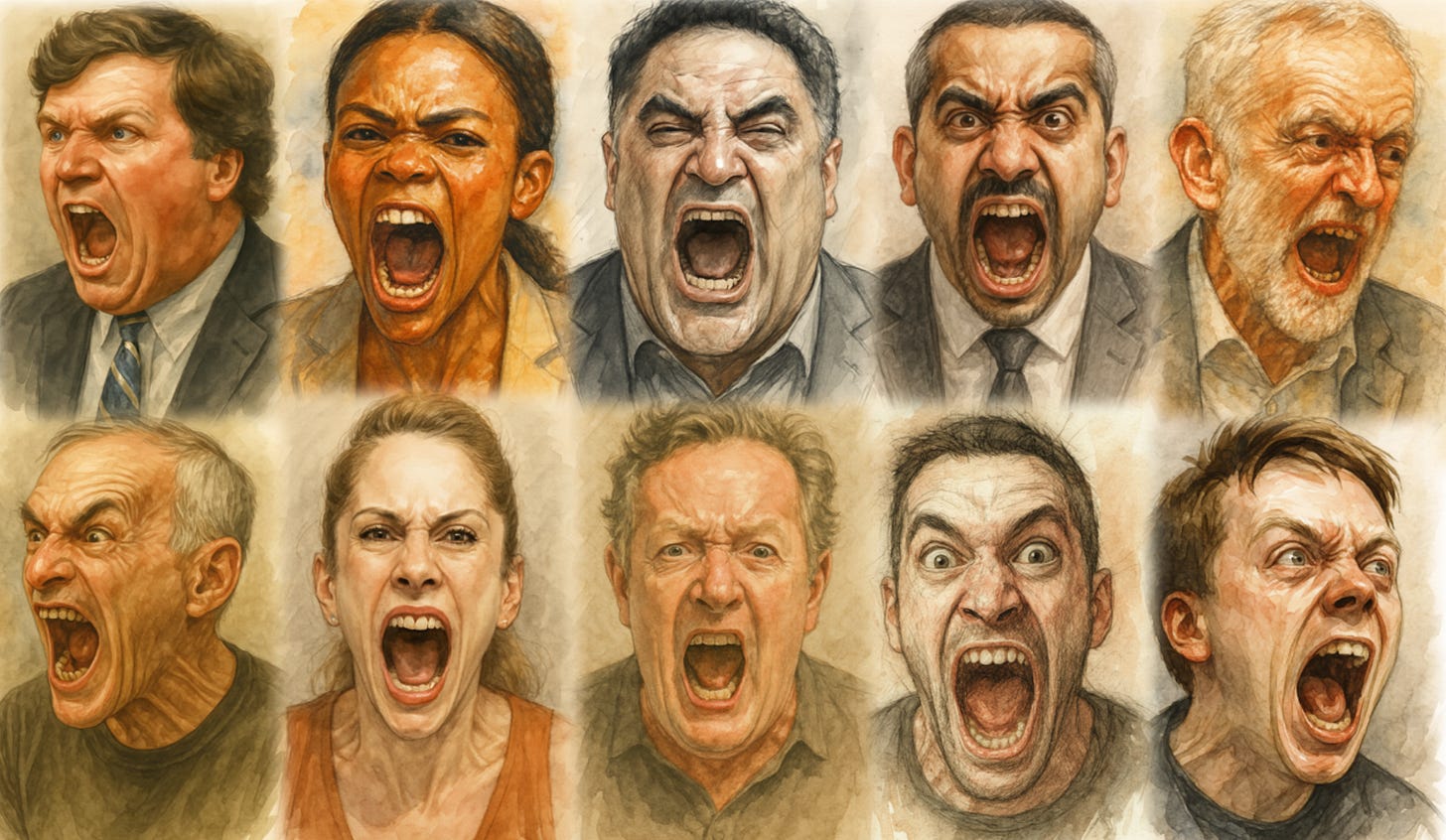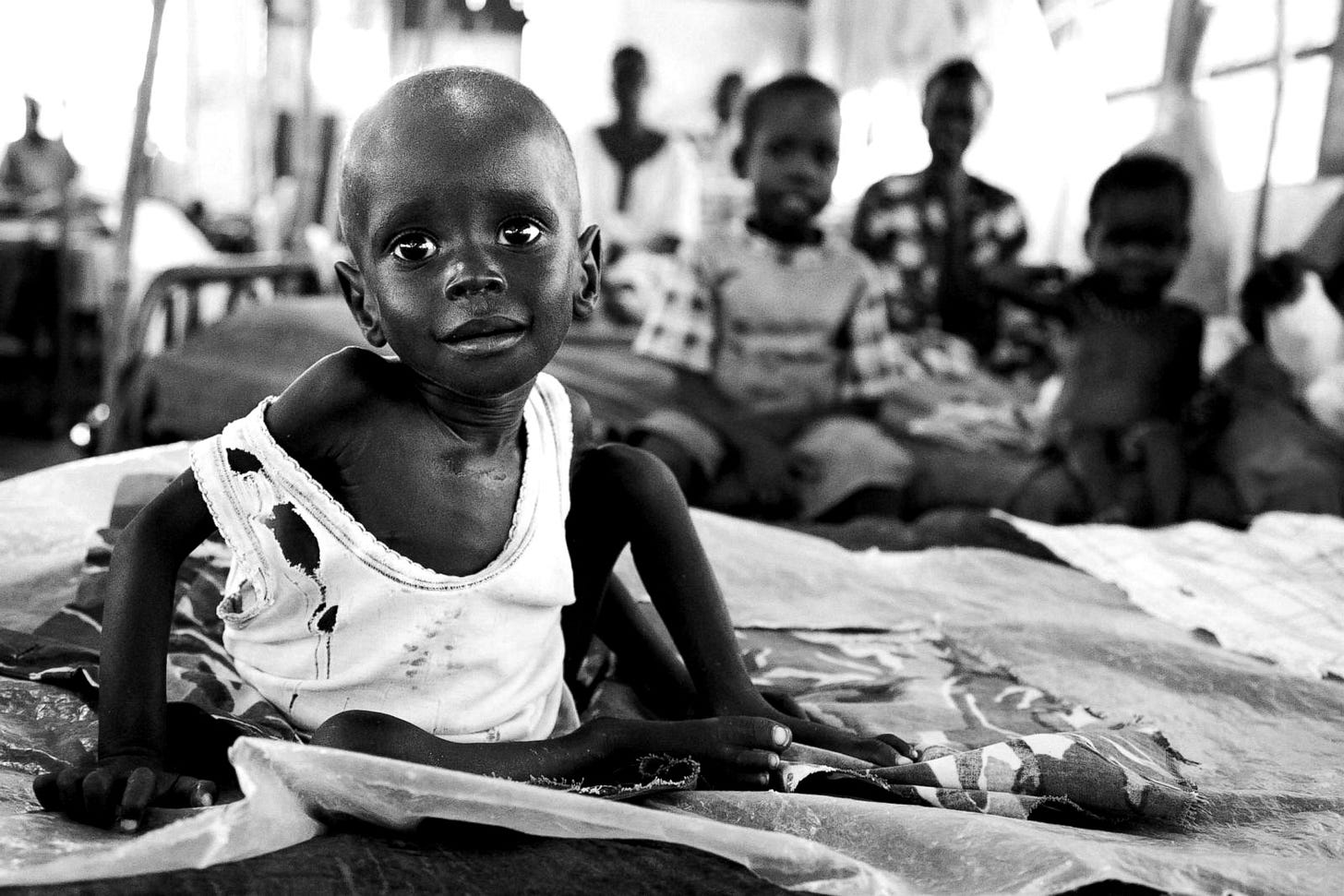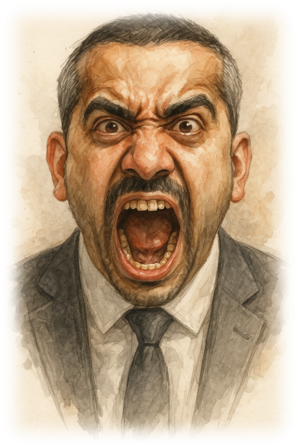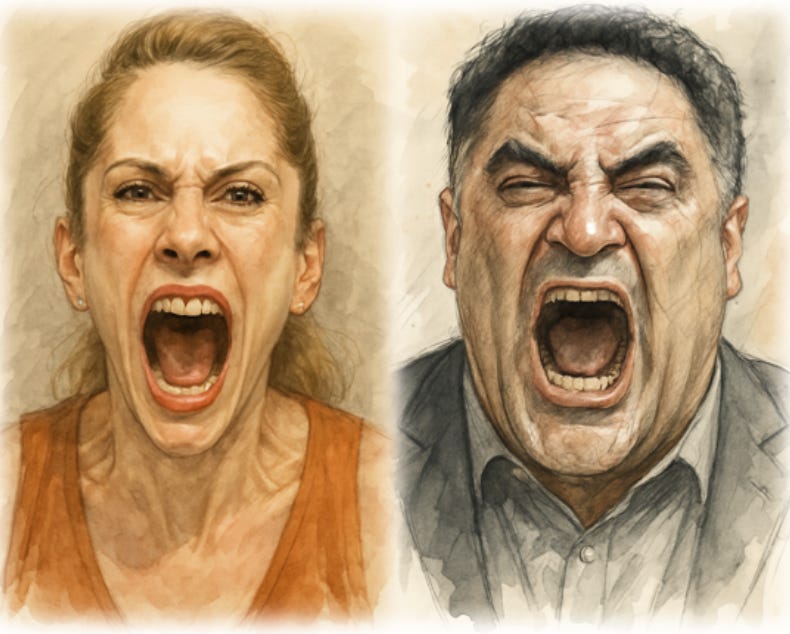Their Hollow Shrieks
A study in performative empathy
They speak in hashtags and scream in soundbites. Their faces contort with moral agony on camera, their voices tremble with righteous fury. “Genocide! Starvation! Dead babies! Ethnic cleansing! War crimes!”
They march to the drum of outrage, not empathy.
But their outrage is not measured by scale, nor their compassion guided by consistency. It is selected, curated, and surgically deployed in perfect synchrony with their ideological agenda. Their solidarity with Gaza is not born of humanitarian instinct but of political convenience. The corpses of children are not mourned but weaponised.
These people - Ana Kasparian, Mehdi Hasan, Cenk Uyghur, "comic" Dave Smith, Owen Jones, Candace Owens, Tucker Carlson, Jeremy Corbyn, Norman Finkelstein etc. - each perform their roles in a tragicomedy of moral theatre. Theirs is a morality play, but one where the victims must audition for sympathy. Sudanese babies starved to death don’t pass the casting call. Uyghur Muslims interned in actual concentration camps? Not relevant to the script. The Christians being butchered in Nigeria? Not dramatic enough. Not useful enough. Not Jewish enough.
To them, Gaza is not a place - it’s a stage. And the Palestinians are not people, they’re props.
This is not an article about the Israeli-Palestinian conflict. It’s not about the atrocities of Hamas, or the merits of ceasefires and security fences. Those are vital debates, but this is about something far more elemental: honesty. Empathy. The obligation to care - truly care - about suffering, regardless of the perpetrator, and regardless of the opportunity to score ideological points.
What follows is a diagnosis. A treatment of the disease that plagues our discourse: the fraudulence of empathy wielded as a cudgel, the phoniness of concern selectively deployed, the charade of outrage that echoes hollow in the face of mass graves they do not bother to notice.
Let’s begin with a principle so obvious it ought to be beyond dispute: if you claim to care about innocent lives, your empathy should scale with both the number of children affected and the brutality of their suffering. Anything less is not compassion - it’s theatre.
I will apply this test to those who fail it, again and again and again.
Their silences will be highlighted. Their priorities scrutinised.
And by the end, dear reader, you will see that their shrieks were never hymns of empathy. They were the hollow cries of opportunists. They do not speak for the voiceless. They scream to be heard. They scream to be seen. They scream only when it suits them.
They scream for views. They say nothing for truth.
It’s time we shut them down.
The Selective Outrage Test
Let us begin with the simplest of moral benchmarks. If a person claims to be driven by humanitarian instinct - to care about the plight of children, the suffering of innocents, the obliteration of civilian life - then their outrage should reflect both the scale and severity of suffering. Not just who the perpetrator is.
This is not controversial. It is self evident.
We should expect, then, that anyone decrying the deaths of 60,000 people in Gaza (if we were to take Hamas’ word as gospel) would be all the more vocal about the deaths of over 500, 000 infants in Sudan due to malnutrition, as reported by the Sudanese Doctors Union. And yet - there is silence. Deafening, incurious, unbroken silence.
It is not that they fail to notice. It is that they choose not to look.
This is the acid test. If a person only ever finds their moral voice when one particular conflict is in the headlines - and only when one particular country can be blamed - they are not driven by empathy. They are driven by ideology. Gaza becomes an instrument - not of awareness, but of attack.
Mehdi Hasan
No one exemplifies this weaponisation of suffering more clearly than Mehdi Hasan.
Hasan is not merely inconsistent - he is pathologically selective. His entire professional brand is built on a masquerade of moral clarity, a pantomime of courage, a theatrical insistence that he stands up for the voiceless. And yet, one looks in vain through his years of broadcasting, writing, and Twitter (I refuse to call it “X”) tirades for any evidence that he has ever cared about the silent genocides of Africa or the industrial-scale oppression of Uyghurs.
One example of this hypocrisy is telling:
In February 2025, during a segment on Piers Morgan Uncensored, Hasan was invited to discuss the grooming gangs scandal - the organised, industrialised rape of working-class girls by predominantly Pakistani Muslim men across Britain. Rather than confront this epidemic, Hasan arrived armed with deflections - examples of white perpetrators, as though they too had been shielded by systemic cowardice and political squeamishness.
When challenged, he insisted with hand-on-heart sincerity, "I care about the victims."
And yet, in his decades-long career, not once has he dedicated a programme, article or tweet to highlight the horror of these assaults. Not one rallying cry. Not one moment of journalistic effort. Until - and only until - those same victims could be deployed to protect his narrative.
One seemingly unrelated moment which capsulate the the shameless dishonesty of the man.
This is not empathy. It is opportunism. A scavenging of tragedy to shield ideology. And it mirrors exactly how he, and others like him, approach the Israeli-Palestinian conflict.
He does not care about the victims of Gaza. He cares about the use of Gaza. And when Sudanese children starve, or Uyghur Muslim mothers are sterilised in camps, or Nigerian Christians are burned alive in their churches - his silence is deafening.
Because those dead children cannot be weaponised against Jews or The West.
The Theatre of Outrage
In the marketplace of public opinion, there exists a peculiar breed of pundit - part-performance artist, part-propagandist - whose empathy is both theatrical and transactional. Their concern is laser-focused, not on the scale of human suffering, but on its ideological utility. Gaza, for these figures, has become less a tragedy than a stage.
Ana Kasparian and Cenk Uyghur provide the masterclass in this moral melodrama. With furrowed brows and rambunctious voices, they simulate outrage as if emotion itself could exonerate their selectivity. Kasparian cries moral outrage, while actually, shamelessly uttering the words “I’m an Armenian, I know a genocide when I see it!”. Uyghur, red-faced and yelling, bellows moral indignation like an overzealous Karen, waiting in line
Their viewers are rewarded with the illusion of courage - look how boldly they challenge the Zionist machine! But try locating a similar level of performative anguish for the children of Sudan or the Uyghur Muslims sterilised in Chinese concentration camps. You’ll find nothing. Because the algorithm of their empathy doesn’t compute atrocity without a Western villain.
But behind this pantomime lies a striking absence. Search their extensive catalogue and you won’t find remotely the same fervour for the worst atrocities in the world, unless they happen to be perpetrated by an American ally. Entire continents of suffering pass without comment, unless they fit the frame.
This is not a mere oversight. It is a pattern. It is the algorithm of their outrage.
This is not simply a case of oversight. It’s dramaturgy. It is the conscious selection of victims based on the narrative they support. The IDF makes the cut. Assad’s barrel bombs do not. The tears flow when the enemy is American-backed. When the perpetrators are Russia, China, Iran, or any non-Western regime? Silence.
Why has Kasparian never broken into trembles for any cause that couldn’t be pinned on the West? Why has Uyghur never ranted for twelve uninterrupted minutes when the villains weren’t the “right” ones? Because there is no political upside. No Western villain, no airtime.
Their compassion is conditional. Their tears are scripted.
They care - theatrically, performatively - when the villain is a designated enemy of their worldview. They are not reporters. They are actors reading from a script, and like all bad actors, they overdo it.
Real empathy does not need rehearsal.
They are not alone. “Comic” Dave Smith, court jester to the anti-West commentariat, has made a career out of sneering at Western foreign policy while offering no solidarity to the truly voiceless. For Smith, every humanitarian disaster is either an opportunity to bash the West or a non-event. If he cannot weaponise the suffering for his podcast, it vanishes.
In Smith's world, nuance is tyranny, expertise is elitism, and every global tragedy is an opportunity to bash the West. He never lets a crisis go to waste - unless, of course, the culprits don’t serve his narrative. Then, like a switch, the outrage shuts off.
His professed concern for Gazans is not born of solidarity, but of convenience. It fits the script. It hits all the beats. He can sneer at corporate media, attack American foreign policy, and cry foul at Zionism - all in one breathless diatribe. But when injustice arises from regimes he can’t exploit for ideological capital? Total silence.
"Comic" Dave Smith is not a comedian. He is a coward. A moral tourist who only visits suffering when the ideological weather is good.
And like all tourists, he never stays long enough to understand anything.
Owen Jones, meanwhile, is the perennial activist-boy who cried fascist - a man whose political commentary rarely rises above the emotional register of a teenager yelling at their parents. He is the king of selective sanctimony. His feed is a geyser of indignation - so long as the target is Israel, capitalism, or the Conservative Party. If the atrocity doesn’t trend or fit the placard, it never happened. There are no tears for Tigray. No columns for Nigeria. Only silence.
These figures curate their compassion. They monetise it. They costume it for the camera. And like all costumes, it is taken off when the performance ends.
There are no podcast monologues for them. No viral clips. No smug punchlines. No ratings. And so, nothing.
This is the grift: to perform care while doing none of the work. Smith and Jones, although on complete different ends of the political spectrum, will spend hours on air mocking Western involvement abroad, yet offer no vision of solidarity with the persecuted, unless he can weaponise their suffering. Their care is conditional. Their morality, a tool of the brand.
When empathy is a brand strategy
Piers Morgan fancies himself the people's inquisitor - a man willing to shout uncomfortable truths while the rest of the media cowers in cowardice. But scratch the surface of his bombast, and you find a compass guided not by principle, but by popularity.
But Morgan, like his fellow performers, has a well-defined target list. His outrage has a preferred postcode.
His treatment of Gaza has been obsessive - countless segments, inflammatory headlines, urgent interviews. But ask him about Sudan, Ethiopia, or Xinjiang, and the righteous thunder evaporates. What remains is silence - and not the silence of ignorance, but of irrelevance.
Morgan’s brand thrives on conflict that flatters his role as fearless contrarian. Gaza offers the perfect tableau: a moral cause that can be hammered home without alienating his audience. But tragedies that can’t be draped in familiar Western guilt don’t feature. They don’t trend. And what doesn’t trend doesn’t air.
Even his repeated indignation about the absence of journalists in Gaza is theatre. Were he even mildly curious beyond the echo chamber, he’d know that frontline war zones - in Mosul, in Bakhmut, in Baghdad - are never open press playgrounds. All of Gaza is an active war zone. But the truth wouldn’t fit the segment.
The same branding logic governs Candace Owens and Tucker Carlson. Their sudden and fleeting concern for Palestinians is not the product of long-standing humanitarianism. It’s a rhetorical detour - a way to bash liberals, cry hypocrisy, and posture as the only ones brave enough to say the unsayable.
Owens rarely acknowledges injustice unless it can be framed as a failure of Western civilisation. Carlson, despite his polished sneer, avoids all mention of atrocities that can’t be pinned on Washington or Brussels. Their concern is not anchored in principle. It’s anchored in profit.
And when the moral market shifts, so does their focus. They are not advocates. They are content curators. They follow the scent of grievance, not the stench of genuine suffering.
Ideology as Moral Filter
Jeremy Corbyn, once the Labour Party’s leader and now the founder of “Your Party,” is perhaps the most consistent figure in the pantheon of selective outrage. His empathy is a straight line drawn through only one part of the map. His moral compass is not broken - it’s rigged. It always finds its direction when there’s an opportunity to rebuke the West, and rarely when the crimes are committed by its enemies.
He found time to call Hamas and Hezbollah his "friends." He laid wreaths on the graves of Black September terrorists. He mourned Qassem Soleimani with more reverence than he showed the victims of Assad’s barrel bombs. He issued statements with clockwork urgency every time Israel defended itself, yet you’ll strain your eyes searching for his tears over the half a million dead in Syria - many of them Palestinians - at the hands of a Ba’athist dictatorship backed by Russia and Iran.
“Your Party,” much like its founder, will not be a party of principled opposition. It will be a stage for the same weary pantomime - where some victims are worthy of vigils, and others don’t even earn a mention.
His new political venture, “Your Party,” is a continuation of this ethos: a stage for curated conscience. Some victims matter. Others are inconvenient.
Norman Finkelstein is what happens when bitterness becomes a political identity. A man whose academic credentials are eclipsed only by his appetite for vendetta, Finkelstein has made a career of shadowboxing with ghosts - a crusader against perceived Zionist overreach who long ago abandoned the cause of universal justice in favour of a monomaniacal obsession with one.
He has become the anti-Zionist’s favourite footnote, his Jewish heritage wielded as a shield by those who use his quotes like talismans. That he is the son of Holocaust survivors has become less a biographical detail and more a ritual incantation - invoked to immunise any and all anti-Israel rhetoric from accusations of bad faith.
But for all the moral currency Finkelstein cashes in on this background, it never seems to extend beyond the confines of the Israeli-Palestinian conflict. The Uyghur Muslims being sterilised in Chinese concentration camps? He has no time for them. The Tigrayan civilians massacred in Ethiopia? Silence. The Sudanese children dying of starvation? No books. No lectures. No outrage.
Finkelstein’s world is a small and selective one - a stage on which Israel is always the villain, and the rest of the world merely set dressing. It is not that he lacks the intellect to understand other global atrocities. It is that he lacks the interest. And worse - he lacks the will.
Even when Israeli civilians are slaughtered - as on 7 October 2023 - his instinct is to minimise, to relativise, to pivot instantly back to Gaza as though the deaths of Jewish innocents were merely an inconvenient detour in his lifelong narrative.
This is not scholarship. It is zealotry dressed in academic robes.
Finkelstein does not speak for victims. He speaks over them. He reduces their stories to footnotes in his war against the one country that has consumed his every waking thought. And in doing so, he has surrendered the credibility he once had.
For someone who endlessly accuses others of moral inconsistency, Norman Finkelstein is strikingly indifferent to the slaughtered, the imprisoned, and the starving - unless their suffering can be traced, however tendentiously, back to Israel.
He is not a universal advocate. He is a man with a grievance, masquerading as a moralist.
The True Motive
So what drives this strange moral geometry - this selective outrage, this partisan grief, this chorus of concern that sings only when the right conductor raises the baton?
It is not empathy. It is not care. It is not, in any meaningful sense, humanitarianism.
It is ideology - and, more specifically, anti-semitism and anti-Western animus dressed up as compassion.
Scratch beneath the surface of every shrieking denunciation, every breathless monologue, every trembling appeal to justice, and you’ll find not a commitment to human dignity, but a compulsive need to denounce Western democracies, particularly Israel, as the sole Jewish state and a close ally of the United States, has become the perfect lightning rod for these projections - a canvas onto which the West’s critics can hurl every historical grievance and moral anxiety.
Their rage is not proportional to suffering. It is calibrated to narrative utility.
Sudanese children do not help them attack imperialism. Uyghurs are inconvenient to their anti-American reflexes. Nigerian Christians burned alive in churches cannot be pinned on the West. And so, these stories vanish. These lives go unlamented.
But Gaza? Gaza is useful. Gaza is photogenic. Gaza is the moral cudgel par excellence. With it, they can condemn the United States, berate Europe, frame Jews as colonisers, and dress up their fury as compassion.
This is not to say criticism of Israel is inherently antisemitic. It is not. But when criticism turns obsessive, when atrocities are viewed solely through the prism of how they can be used to attack Israel, when silence follows every other massacre that cannot be turned against a Western power - the mask slips.
This is not humanitarianism. It is opportunism.
This is not solidarity. It is sabotage.
This is not the voice of the voiceless. It is the propaganda of the embittered.
Conclusion
They scream with fury. But they do not mourn.
They shriek, but they do not care.
Their mouths are wide open, but their outrage is reserved solely for the Jewish state and Western societies.
They shriek for Gaza not because they love Gazans, but because they hate their enemies.
They shriek not to elevate the dead, but to weaponise them.
They shriek - but only when the script demands it.
And for the rest? For the Sudanese child dead from hunger? The Nigerian girl kidnapped and raped? The Uyghur mother sterilised in a camp? Nothing.
No scream. No sound. No soul.
True empathy is quiet. It is universal. It is consistent. It is deeply uncomfortable, because it holds even your friends to account. It is grounded not in tribal loyalty but in moral clarity.
Theirs is not empathy. It is theatre.
And the curtain, at long last, must fall.
History will remember the victims they ignored - the crimes they overlooked, the genocides they treated as footnotes.
And when their names are mentioned, it will not be as defenders of the oppressed. It will be as the shrieking actors in a cheap morality play, whose voices echoed loudest when they had least to say.
Their shrieks were hollow.
And history will answer them with silence.











As an American I so appreciate this article, especially since you slice the people on this side of the Pond for whom I hold the greatest contempt: Cenk Uyghur, Tucker Carlson, Candace Owens, and Dave Smith.
As for Ana "I'm Armenian" Kasparian -- a dear friend of mine who passed away one year ago was the granddaughter of an Armenian who fled their holocaust in World War I. She would've been outraged at Kasparian.
Why do those people need to wear identity like a hair shirt? Dave Smith and Finkelstein: "I'm Jewish!" Tucker Carlson: "I'm an American, I love this country!" And of course, Kasparian.
Dudes, if you're explaining, you're losing.
Again, thank you for this.
Perfectly stated and great analysis. Thank you for your moral courage.